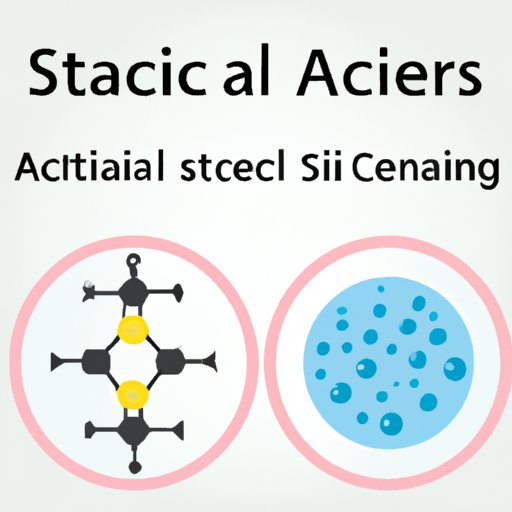Introduction
Acne is a common skin condition that affects millions of people all over the world. It can be an embarrassing and frustrating problem, but there are many treatments available to help manage it. One of the most popular treatments is salicylic acid, which is used in many over-the-counter products. But can salicylic acid actually cause acne? This article will explore the role of salicylic acid in the treatment of acne, examining whether it can cause acne as well as its benefits and risks compared with other treatments.
Investigating if Salicylic Acid Can Cause Acne
Before exploring the role of salicylic acid in acne treatment, it’s important to understand what causes acne in the first place. Acne is caused by an overproduction of oil in the skin, which leads to clogged pores and bacteria growth. The most common type of acne is called “acne vulgaris”, which is characterized by pimples, blackheads, and whiteheads. Other types of acne include cystic acne, nodules, and papules.
So, does salicylic acid contribute to acne? While some people believe that salicylic acid can actually cause acne, research suggests that this is not the case. In fact, salicylic acid is often used in acne treatments because it helps to unclog pores and reduce inflammation. However, it’s possible that using too much salicylic acid can aggravate existing acne and even lead to more breakouts.

How to Effectively Use Salicylic Acid for Acne Treatment
If you’re considering using salicylic acid to treat your acne, there are a few things you should keep in mind. First, it’s important to note that salicylic acid can be very beneficial when used correctly. It can help to unclog pores, reduce inflammation, and even prevent future breakouts. It’s also important to use the product carefully and only as directed.
When applying salicylic acid, it’s important to avoid getting it into your eyes, nose, or mouth. You should also avoid using it on broken or irritated skin, as this can cause further irritation. Additionally, you should never use more than the recommended amount, as this can lead to dryness, redness, and even burning. Finally, it’s important to remember that salicylic acid can make your skin more sensitive to the sun, so you should always wear sunscreen when using it.

Exploring the Benefits and Risks of Salicylic Acid for Acne
As with any treatment, there are both benefits and risks associated with using salicylic acid for acne. On the plus side, salicylic acid can help to unclog pores, reduce inflammation, and even prevent future breakouts. Additionally, it’s generally well tolerated and can be found in many over-the-counter products. However, it’s important to remember that salicylic acid can also cause dryness, redness, and burning if used incorrectly or in too large of amounts.
In addition, salicylic acid can also cause irritation and even allergic reactions in some individuals. If you experience any of these symptoms, you should stop using the product immediately and consult a doctor. Additionally, salicylic acid can make your skin more sensitive to the sun, so it’s important to use sunscreen when using it.

A Comparison of Salicylic Acid and Other Acne Treatments
When it comes to treating acne, there are many different options available. Some of the most popular treatments include benzoyl peroxide, retinoids, antibiotics, and salicylic acid. Each of these treatments has its own advantages and disadvantages, so it’s important to consider all of them before deciding which one is best for you.
Salicylic acid is often considered one of the most effective treatments for acne. It can help to unclog pores, reduce inflammation, and even prevent future breakouts. However, it can also cause dryness, redness, and burning if used incorrectly or in too large of amounts. Additionally, it can make your skin more sensitive to the sun, so you should always wear sunscreen when using it.
On the other hand, benzoyl peroxide is another popular acne treatment that can help to kill bacteria and reduce inflammation. However, it can also cause dryness, redness, and peeling if used incorrectly or in too large of amounts. Additionally, it can bleach fabrics and discolor hair, so it’s important to take extra care when using it.
Finally, antibiotics and retinoids are two other options for treating acne. Antibiotics can help to reduce bacteria and inflammation, but they can also cause dryness and irritation. Retinoids can help to unclog pores and reduce inflammation, but they can also cause redness, peeling, and sensitivity to the sun.
Conclusion
Salicylic acid is a popular treatment for acne that can help to unclog pores, reduce inflammation, and even prevent future breakouts. However, it’s important to use it carefully and only as directed, as it can cause dryness, redness, and burning if used incorrectly or in too large of amounts. Additionally, it can make your skin more sensitive to the sun, so you should always wear sunscreen when using it. Finally, it’s important to compare salicylic acid with other treatments to determine which one is best for you.


